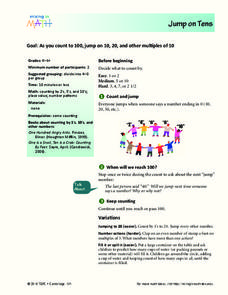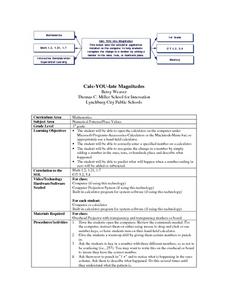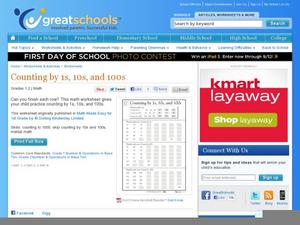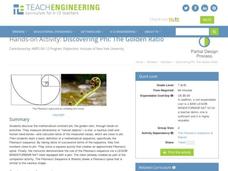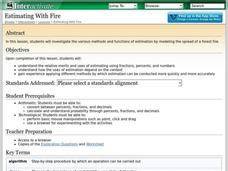Curated OER
Math Vocabulary
In this math vocabulary worksheet, 6th graders match twenty-three math vocabulary words from column A to the definitions in column B.
Curated OER
Jump on Tens
Give the actors in your class a chance to shine as they act out skip-counting. In their roles, they take turns shouting out different number patterns and jumping when reaching the given goals set for each number family. A fun and...
Curated OER
Spin a Window!
How many windows does this school bus have? If your class is new to counting, this will be a fun way to get them some practice. Cut out and laminate the spinner template and set it up to spin (instructions written out if you need them)....
Curated OER
How Much Is A Million
In this millions activity, students solve and complete 4 different problems that include counting large numbers. First, they identify the patterns found in the table illustrated. Then, students place the correct number on the dotted...
Curated OER
Probability and Patterns with Pascal
In this Pascal activity, students solve word problems dealing with probability and patterns based on Pascal's triangle theory. Students complete 10 problems total.
Math Mammoth
Add & Subtract Whole Hundreds 1
In this mathematics worksheet, 3rd graders compare the problem 2700 plus 200 to the problem 27 plus 2 and explain their reasoning. Then they notice the patterns for each of the problems and continue them.
Curated OER
How Many Cards Do We Need to Display the Dates of the Month?
Students complete activities to study the concept of place value notation. In this place value lesson, students use cards for the days of the month that only number from 1 to 9. Students find a subtraction pattern to determine the amount...
Curated OER
Calc-You-Late Magnitudes
First graders are introduced and practice using a calculator. Individually, they enter and complete simple addition and subtraction problems. After the answer is displayed, they identify the place value for ones, tens, and hundreds...
Illustrative Mathematics
Seven Circles III
A basic set-up leads to a surprisingly complex analysis in this variation on the question of surrounding a central circle with a ring of touching circles. Useful for putting trigonometric functions in a physical context, as well as...
EngageNY
Writing and Evaluating Expressions—Multiplication and Addition
How many people can sit around a table? The 22nd part in a series of 36 continues the work on writing and evaluating expressions to include expressions with two operations. Pupils use models to determine an expression for the number of...
Curated OER
What's in the Bag?
Help your students identify the attributes of two-dimensional shapes. They read the book Round is a Mooncake, and use pattern blocks to sort shapes. Students sort shapes according to their attributes.
Illustrative Mathematics
Seven to the What?!?
Sometimes what seems like the easiest problem is really the most difficult. Your class is first going to reach for their calculators, but will realize the number is too large to evaluate. Now what? This is where the fun and the...
Illustrative Mathematics
Building toward fluency
Here is a great learning task that focuses on the development of areas in computational fluency including strategies in mental math. Young learners are guided through a list of addition expressions that help them visually understand the...
Curated OER
Counting by 1s, 10s, and 100s
These sequences are missing numbers and require some skip counting to complete. Scholars finish rows of numbers first counting by 1s, then 10s, and finally 100s. Each has three given numbers to get them started, and they fill in five...
NASA
Food For Thought
Science can be quite tasty. A delectable unit from NASA shows learners why it's important to consider food, nutrition, and health in space. Four lessons explore the idea in great depth, including testing cookie recipes. Along the way,...
Teach Engineering
Discovering Phi: The Golden Ratio
Fe, phi, fo, fum. This activity leads pairs to find the ratio of consecutive terms of the Fibonacci sequence. The pairs find that the Fibonacci sequence can be found in many places. A discussion with the class shows that the ratios...
Curated OER
Hundred Chart
In this math worksheet, students examine a chart which features the numbers from 1 to 100 in a grid. There are no directions for this chart which can be used in many ways for discovering number patterns, place value or multiples.
Curated OER
Level 2 Test 2 Math Assessment
In this math assessment worksheet, students complete a 100 question multiple choice test. Included are: mixed operations, fractions, geometry, money, patterns, graphs, time and estimation. Text is written in all capital letters.
Curated OER
Rolling For Value
Students participate in a lesson to comprehend the concept of probability while rolling dice. They recognize patterns while making observations and recording the data for each roll. Students also review place values while playing a game...
Shodor Education Foundation
Estimating With Fire
Watch the damage from a forest fire in this interactive simulation activity that challenges learners to estimate the burn area using different approaches. Learners are given a worksheet to track the different burn patterns and practice...
Curated OER
Same and Different
For this mathematics worksheet, students first complete the tens place and then add the rest. Then they continue the patterns and compare each column. Students also fill in the missing addends and solve various word problems by writing a...
Curated OER
Places and Production
Students investigate the economy and the market value of goods. In this algebra lesson, students differentiate between domestic goods value and international good value. The define and identify the importance of GDP or Gross Domestic...
Curated OER
Grade 5 Math Quiz
For this grade 5 math quiz worksheet, 5th graders complete a 15 question multiple choice quiz covering a variety of grade 5 concepts.
Curated OER
Adding Tenths
In this mathematics worksheet, 4th graders identify what is missing from the whole 1 in each problem. Then they draw a number line from 0 to 2 with tick marks at every tenth place. Students also add each decimal and write their...



